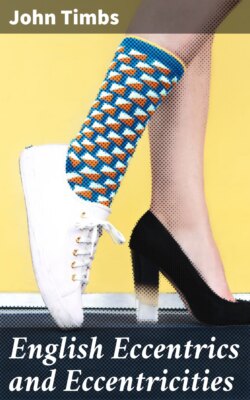Читать книгу English Eccentrics and Eccentricities - John Timbs - Страница 36
На сайте Литреса книга снята с продажи.
Eccentricities of the Earl of Bridgewater.
ОглавлениеTable of Contents
Forty years since there lived in Paris the Rev. Francis Henry Egerton, Earl of Bridgewater, of whom we find this probably overcharged but curious account in a Parisian journal of the year 1826; than his lordship no one has a higher claim to a distinguished place in the history of human oddities:—"Those who have once seen—nay, those who have never seen this meagre personage drag himself along, supported by two huge lacqueys, with his sugar-loaf hat, slouched down over his eyes, cannot fail to recognize him. An immense fortune enables him to gratify the most extravagant caprices that ever passed through the head of a rich Englishman. If he be lent a book, he carries his politeness so far as to send it back, or rather have it conveyed home, in a carriage. He gives orders that two of his most stately steeds be caparisoned under one of his chariots, and the volume, reclining at ease in milord's landau, arrives, attended by four footmen in costly livery, at the door of its astounded owner. His carriage is frequently to be seen filled with his dogs. He bestows great care on the feet of these dogs, and orders them boots, for which he pays as dearly as for his own. Lord Bridgewater's custom is an excellent one for the boot-maker; for, besides the four feet of each of his dogs, the supply of his own two feet must give constant employment to several operatives. He puts on a new pair of boots every day, carefully preserving those he has once worn, and ranging them in order; he commands that none shall touch them, but takes himself great pleasure in observing how much of the year has each day passed, by the state of his boots."
"Lord Egerton is a man of few acquaintance, and very few of his countrymen have got as far as his dining-hall. His table, however, is constantly set out with a dozen covers, and served by suitable attendants. Who, then, are his privileged guests? No less than a dozen of his favourite dogs, who daily partake of milord's dinner, seated very gravely in arm-chairs, each with a napkin round his neck, and a servant behind to attend to his wants. These honourable quadrupeds, as if grateful for such delicate attentions, comport themselves during the time of repast with a decency and decorum which would do more than honour to a party of gentlemen; but if, by any chance, one of them should, without due consideration, obey the natural instinct of his appetite, and transgress any of the rules of good manners, his punishment is at hand. The day following the offence the dog dines, and even dines well; but not at milord's table; banished to the ante-chamber, and dressed in livery, he eats in sorrow the bread of shame, and picks the bone of mortification, while his place at table remains vacant till his repentance has merited a generous pardon!"
This eccentric nobleman died in February, 1829, and by his will, dated February 25th, 1825, bequeathed 8,000l. for the writing, printing, and publishing of the well-known Bridgewater Treatises.
